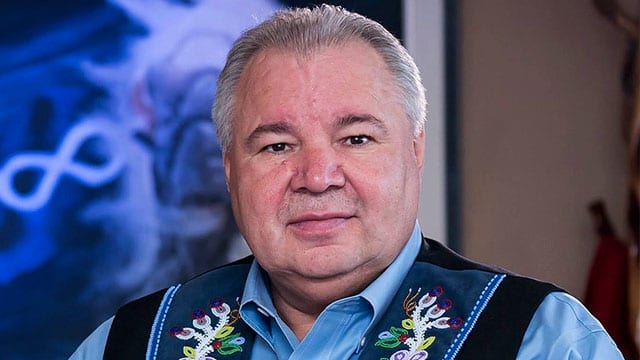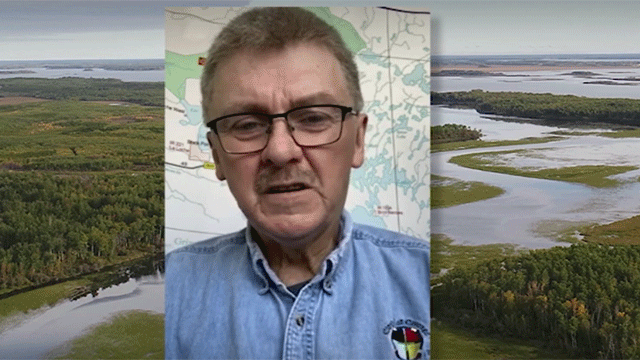
(David Chartrand is also the president of the Manitoba Metis Federation. Photo: APTN file)
Metis villages in northern Saskatchewan with rising COVID-19 cases are in “jurisdictional limbo” between federal and provincial governments that left them underprepared for the coronavirus pandemic, according to Metis National Council (MNC) spokesperson David Chartrand.
“There was no plan, no supports, no programs, no supply chain, nothing, because both governments are saying, ‘No, it’s not my jurisdiction. It’s yours.’,” Chartrand told the Standing Committee on Indigenous and Northern Affairs (INAN), which met virtually to discuss the pandemic’s impact on Indigenous communities.
“Both are still blaming each other, and [COVID-19’s] still creeping into the next villages now because families are taking it to the next villages not realizing they’re carrying it.”
First Nations Inuit Health Branch (FNIHB) which is under Indigenous Services Canada (ISC) provides on-reserve health-care services for First Nations as well as Inuit in the territories but throughout the pandemic has said Metis communities are under provincial jurisdiction.
But Chartrand says the province passes responsibility back to Ottawa.
“At the provincial level, despite our staggering chronic illnesses, the province tells us to deal with the federal government to deal [with] our unique health-care conditions and needs. Our pandemic plans have been limited to providing income and food supports,” he said.
According to the Incident Command Centre (ICC) in northwestern Saskatchewan, 146 people had tested positive for the novel coronavirus in the municipalities of Beauval, La Loche, Buffalo Narrows, Ile-a-la-Crosse and Jans Bay as of May 7.
“Those are all Metis villages,” Chartrand said.
According to ISC, there were 168 confirmed cases of COVID-19 on First Nations reserves in the provinces.
As numbers rise in the regions surrounding La Loche and Beauval, municipalities in the region may soon have more cases of COVID-19 than all First Nations reserves in the country combined.
Clearwater River Dene Nation, which is next to La Loche, has reported 16 confirmed cases.
“Just for those of you that do not know, the Metis community of Western Canada, nearly every reserve, you’ll find a Metis village next door to it,” he told the committee.
Though Clearwater has a smaller population, Chartrand attributed the disparity in numbers to the fact that First Nations had pandemic plans through FNIHB while adjacent Metis villages were caught in a “dark zone” between jurisdictions.
“Our pandemic plan has been limited by our lack of access to Metis health-care services. despite all research that shows how important it is to have culturally competent and safe health-care, Metis have been shut out of the provincial and federal health-care systems,” he said.
(Rick Laliberte is calling for a Treaty 10 pandemic council in northwestern Saskatchewan, which AFN National Chief Perry Bellegarde urged the committee to support.)
Chartrand also said that Metis municipalities don’t have access to ISC’s federal stockpile of personal protective equipment (PPE), which the government says is shipped to First Nations communities within 24 hours.
“None of this was distributed to the Metis community,” Chartrand said, adding that Manitoba Metis purchased PPE from China instead.
“When these stockpiles are taking place in Canada, I’m sad to say a leader that it’s not inclusive of us. We have nothing. We don’t get one mask. We don’t get one band-aid, let’s put it that way.”
Metis did receive help through the federal government’s Indigenous Community Support Fund, which Chartrand said was greatly appreciated.
“The $30 million is enabling the MNC’s governing members or provincial affiliates to provide the immediate supports for Metis Nation citizens, families and seniors. They have developed and are rolling out action plans providing immediate supports such as food, income, supplies and rent supplements,” he said.
“At the same time, the health emergency has opposed the particular vulnerability and disadvantage of the 400,000-strong Metis Nation population. It is highlighted by the distressing fact that neither level of government has taken responsibility to address the deep-seated health conditions of the Metis people in Canada,” he added.
While Metis communities in Saskatchewan have been hit hard, Manitoba has yet to confirm a case of COVID-19 in First Nations or Metis communities.
Rick Laliberte, the incident commander coordinating northwestern Saskatchewan’s pandemic response, told APTN News the ICC was formed in part because local First Nations leaders were pulling their pandemic plans off the shelves but municipalities had “no such plan.”
He later called for the creation of a Treaty 10 pandemic council that would include Metis leaders, First Nations chiefs and municipal mayors.
On multiple occasions as the committee hearing progressed, AFN National Chief Perry Bellegarde encouraged Ottawa to get behind the idea of a more integrated response.
“Support the Treaty 10 pandemic plan that Rick Laliberte and all the mayors and the chiefs are working on together,” he said.
“Support that.”
As numbers rose in northwestern Saskatchewan, both Ottawa and Regina started sending additional material and human resources, personal protective equipment (PPE), and point-of-care rapid testing equipment.
Bellegarde and Chartrand urged federal and provincial governments to set jurisdictional disputes aside and work together during the public health emergency.











